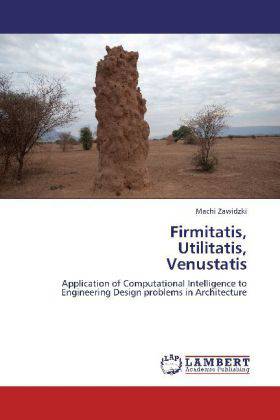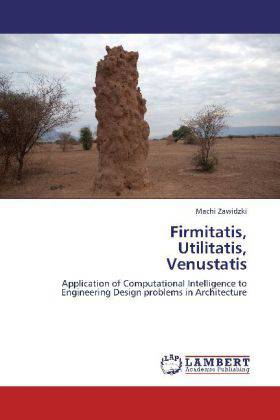
Door een staking bij bpost kan je online bestelling op dit moment iets langer onderweg zijn dan voorzien. Dringend iets nodig? Onze winkels ontvangen jou met open armen!
- Afhalen na 1 uur in een winkel met voorraad
- Gratis thuislevering in België vanaf € 30
- Ruim aanbod met 7 miljoen producten
Door een staking bij bpost kan je online bestelling op dit moment iets langer onderweg zijn dan voorzien. Dringend iets nodig? Onze winkels ontvangen jou met open armen!
- Afhalen na 1 uur in een winkel met voorraad
- Gratis thuislevering in België vanaf € 30
- Ruim aanbod met 7 miljoen producten
Zoeken
Firmitatis, Utilitatis, Venustatis
Application of Computational Intelligence to Engineering Design problems in Architecture
Machi Zawidzki
Paperback | Engels
€ 77,95
+ 155 punten
Omschrijving
Over two millennia ago the Roman architect Vitruvius formulated the three principles of Architecture: 1. Durability (L. firmitatis) - it should stand up robustly and remain in good condition;2. Utility (L. utilitatis) - it should be useful and function well for the people using it; and 3. Beauty (L. venustatis)- it should delight people and raise their spirits.Presently, the first two problems belong entirely to the field of Engineering Design, and the third one at least partially. Application of Computational Intelligence (CI) methods to these fundamental problems of Architecture is presented. The novelty of proposed solutions is based on the paradigm shift in the sciences caused by the introduction of "computation" in the middle of the XXth century and the resulting ability to effectively mimic natural heuristics for problem solving.
Specificaties
Betrokkenen
- Auteur(s):
- Uitgeverij:
Inhoud
- Aantal bladzijden:
- 212
- Taal:
- Engels
Eigenschappen
- Productcode (EAN):
- 9783845402192
- Verschijningsdatum:
- 7/07/2011
- Uitvoering:
- Paperback
- Formaat:
- Trade paperback (VS)
- Afmetingen:
- 152 mm x 229 mm
- Gewicht:
- 317 g

Alleen bij Standaard Boekhandel
+ 155 punten op je klantenkaart van Standaard Boekhandel
Beoordelingen
We publiceren alleen reviews die voldoen aan de voorwaarden voor reviews. Bekijk onze voorwaarden voor reviews.











